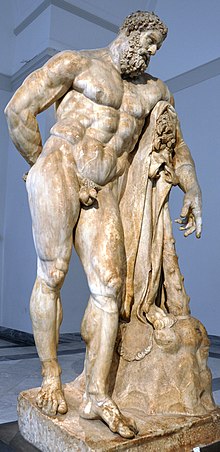Herakles
| Heracles | |
|---|---|
| Gatekeeper of Olympus God of strength, heroes, sports, athletes, health, agriculture, fertility, trade, oracles and divine protector of mankind |
|

One of the most famous depictions of Heracles, originally by Lysippos (marble, Roman copy called Hercules Farnese, 216 CE)
|
|
| Abode | Mount Olympus |
| Symbol | Club, Nemean Lion, bow and arrows |
| Consort | Hebe and various others |
| Parents | Zeus and Alcmene |
| Siblings | Aeacus, Angelos, Aphrodite, Apollo, Ares, Artemis, Athena, Eileithyia, Enyo, Eris, Ersa, Hebe, Helen of Troy, Hephaestus, Hermes, Minos, Pandia, Persephone, Perseus, Rhadamanthus, the Graces, the Horae, the Litae, the Muses, the Moirai |
| Children | Alexiares and Anicetus, Telephus, Hyllus, Tlepolemus |
| Roman equivalent | Hercules |
| Born | Thebes, Boeotia, Greece |
Heracles (/ˈhɛrəkliːz/ HERR-ə-kleez; Ancient Greek: Ἡρακλῆς, Hēraklēs, from Hēra, "Hera"), born Alcaeus (Ἀλκαῖος, Alkaios) or Alcides (Ἀλκείδης, Alkeidēs), was a divine hero in Greek mythology, the son of Zeus and Alcmene, foster son of Amphitryon and great-grandson and half-brother (as they are both sired by the god Zeus) of Perseus. He was the greatest of the Greek heroes, a paragon of masculinity, the ancestor of royal clans who claimed to be Heracleidae (Ἡρακλεῖδαι) and a champion of the Olympian order against chthonic monsters. In Rome and the modern West, he is known as Hercules, with whom the later Roman emperors, in particular Commodus and Maximian, often identified themselves. The Romans adopted the Greek version of his life and works essentially unchanged, but added anecdotal detail of their own, some of it linking the hero with the geography of the Central Mediterranean. Details of his cult were adapted to Rome as well.
...
Wikipedia
